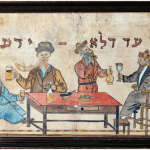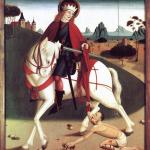Dorothy Day never, as far as I can tell, allowed the pockmarks of a hard life to show. She never came to resent anyone. She remained steadfast and humble. She lived for God, come what or who may. We see this in her writing as much as in her life:
In the Old and New Testaments there are various ways in which the relationship of God and men [is] mentioned. There is the shepherd and his sheep. “The Lord is my shepherd.” “I am the Good Shepherd.” The animal and the man. There is the servant and the master, there is the son and the father, and there is the bride and the bridegroom. “Behold, the bridegroom cometh.” The Song of Songs, the Canticle of Canticles, is all about love. “Let Him kiss me with the kisses of His mouth.”
It is hard to believe in this love. In a book by Hugh of St. Victor, which I read once on the way from St. Paul to Chicago, there is a conversation between the soul and God about this love. The soul is petulant and wants to know what kind of a love is that which loves everyone indiscriminately, the thief and the Samaritan, the wife and the mother and the harlot? The soul complains that it wishes a particular love, a love for herself alone. And God replies fondly that, after all, since no two people are alike in this world, He has indeed a particular fondness for each one of us, an exclusive love to satisfy each one alone.
It is hard to believe in this love because it is a tremendous love. “It is a terrible thing to fall into the hands of the living God.” If we do once catch a glimpse of it, we are afraid of it. Once we recognize that we are sons of God, that the seed of divine life has been planted in us at baptism, we are overcome by that obligation placed upon us of growing in the love of God. And what we do not do voluntarily, He will do for us. Father Roy, our dear Josephite friend who worked with us at Easton and who has been these past two years in a hospital in Montreal, learning what it is to be loved, used to tell a story of a leper he met at a hospital up on the Gaspé peninsula. The leper complained to him, How could he believe in the love of God?
Father Roy proceeded to tell his favorite story. First of all, there is dirt, the humus from which all things spring, and the flower says to the dirt, “How would you like to grow and wave in the breeze and praise God?” And the dirt says “Yes,” and that necessitates its losing its own self as dirt and becoming something else. Then the chicken comes along and says to the flower, “How would you like to be a chicken and walk around like I do and praise God?” And the flower assures the chicken that it would like it indeed. But then it has to cease to be a flower. And the man comes to the chicken and says to it, “How would you like to be a man and praise God?” And of course the chicken would like it too, but it has to undergo a painful death to be assimilated to the man, in order to praise God.
When Father Roy told this story, he said with awe, “And the leper looked at me, and a light dawned in his eyes, and he clasped my hands and gasped, ‘Father!’ And then we both cried together.”
Father Roy is a childlike man, and the Russian leper up in the Canadian peninsula was a simple sufferer, and he saw the point that Father Roy was trying to make, and he began to believe in this love and to see some reason for his sufferings. He began to comprehend the heights and the depths and the strange mystery of this love. But it still takes the eyes of faith to see it.
The love of God and man becomes the love of equals, as the love of the bride and the bridegroom is the love of equals, and not the love of the sheep for the shepherd, or the servant for the master, or the son for the father. We may stand at times in the relationship of servant, and at other times in that of son, as far as our feelings go and in our present state. But the relationship we hope to attain to is that of the love of the Canticle of Canticles. If we cannot deny the self in us, kill the self-love, as He has commanded, and put on the Christ life, then God will do it for us. We must become like Him. Love must go through these purgations. (On Pilgrimage)
Whatever one thinks of Fr. Roy—heck whatever one thinks of Dorothy—this is a reminder, a reminder that matters, a reminder that there is a way beyond bitterness and beyond disappointment, a simple way that takes us beyond expectation and into the world of self-abnegation.













